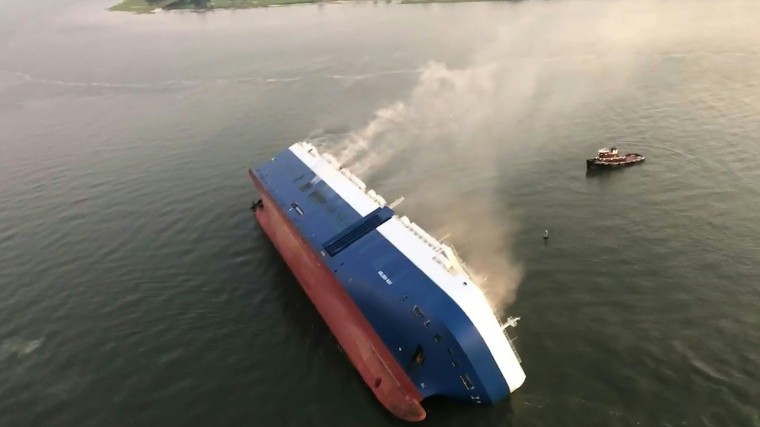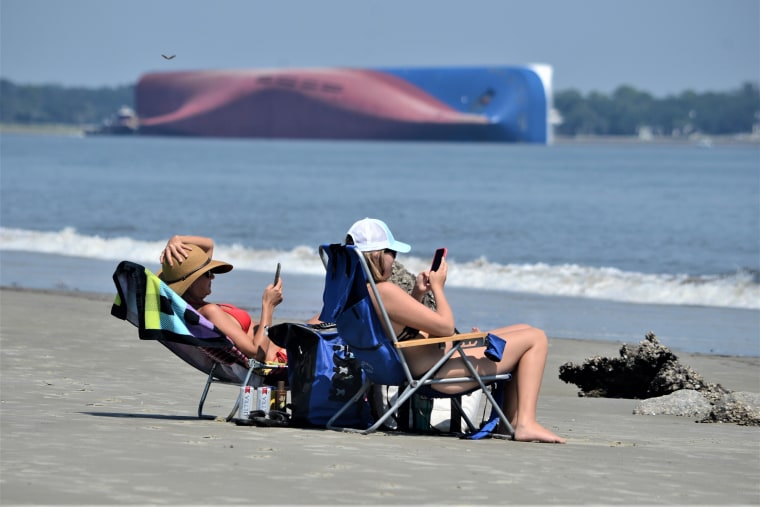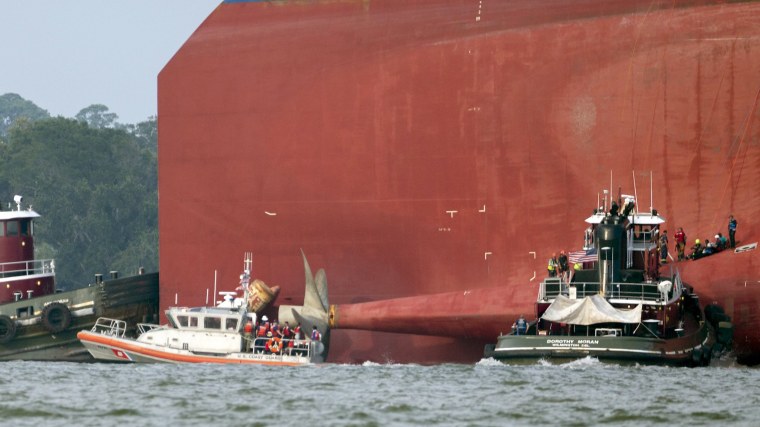Now the hard work begins.
The dramatic rescue of the last four crew members trapped inside the capsized M/V Golden Ray off the Georgia coast on Monday signaled the start of a new challenge for maritime authorities and salvors: What do you do with a 650-foot-long, 71,000-ton cargo ship filled with oil and thousands of cars, flopped over on its side, blocking the nation's second-busiest port for vehicles and heavy machinery?
Attention swiftly turned to that conundrum Tuesday even as the world was celebrating the safe rescue of all 24 people aboard the Golden Ray.
Senior Chief Petty Officer Justin Irwin, the officer in charge at Coast Guard Station Brunswick, called the rescue operation "a pure miracle." He said severe dehydration was already kicking in for the last four men who were pulled from the ship Monday after having been trapped for 40 hours in pitch dark, broiling conditions.
The temperature at St. Simons Sound, near Brunswick, hit 93 degrees Sunday and 92 Monday, and Irwin said in an interview on NBC's "Today" that it was "about 140 degrees in these compartments."
"Pitch black dark. No water. No food. Disoriented. Covered in oil," Irwin said. "Just pure horror."
Cmdr. Norm C. Witt, the commanding officer at Coast Guard Marine Safety Unit Savannah, quoted a colleague on Tuesday as having called the rescue "the best day of his Coast Guard career." But Witt has a new job now, and he swiftly focused his attention on that.
"This is a complex case," Witt told reporters. "We have salvage to deal with on a large vessel. We have pollution mitigation efforts ongoing and some waterways and port operations issues, as well."
Witt warned that the full operation of securing and removing the Golden Ray could take months.
"I would say that each step of the way, we're continuing to redefine those plans as we learn more about the condition of the ship and trying to make sure that our processes are as safe and effective as possible," he said. "This is definitely something that we want to get right the first time."

The Port of Brunswick, about 70 miles south of Savannah, remained closed Tuesday. It's the second-busiest automobile port in the country; in the fiscal year that ended June 30, more than 613,000 vehicles and heavy machinery units moved across its docks, according to figures from the Georgia Ports Authority.
Witt said Tuesday that the earliest the port could reopen to limited one-way traffic would be Thursday — and he stressed that that was a "very aggressive goal."
"There's a lot of things that may cause us to shift that timeline further down the road," he said.
It's not just car deliveries that are being blocked.
"Well, as they say — no ship, no pay," Georgette Drafts, a local resident who said her job depends on the Golden Ray, told NBC affiliate WTLV of Jacksonville, Florida.
Brenda Davis said she works on the ship, and "No work, no money," she told WTLV.
In addition to shipping, the region relies on tourism and fishing as major economic drivers. The 137-mile-long Altamaha River, which empties into the Atlantic Ocean near Brunswick, is central to the local economy. Residents described a slick coating on the water in the area with an oily sheen Tuesday.
"Being that I make my living off the water," the impact could be extensive, Rob Aldridge, a full-time fishing guide in South Georgia and North Florida, said in a video published Tuesday by Altamaha Riverkeeper, a nonprofit environmental group dedicated to protecting the Altamaha and its tributaries.
"As far as our estuaries, we obviously have a marsh out here with a lot of fish, bait, bird life, sea turtles, dolphins and stuff that are dependent on bait fishing in the waters," Aldridge said. "When you run across that sheen, there's not a lot of life out there except for birds landing in it."

Witt of the Coast Guard acknowledged some oil was in the water, but he said it was "limited in scope."
"If you think about taking a bottle that you pour oil into with maybe some residue on the side, if you put that in the water, you are going to get some sheening," Witt said.
Authorities said they were cautiously optimistic that there wouldn't be a major spill. But like any large ship, the Golden Ray is filled with oil and other lubricants. So are the 4,200 cars and vehicles inside.
"So this is a piece of equipment, and it is positioned in the water not in a way that it was designed to," Witt said. "The vessel is on its side, and it's not designed to be on its side. We will have some pollution."
Reed, the Coast Guard captain, said that, as with the rescue itself, it would be a complex exercise in managing risk to salvage the Golden Ray while protecting the environment and moving swiftly enough to limit commercial damage.
"There's always risk in the things we do, and we had to balance that risk" during the rescue, he said. "That operation continues as they look to mitigate the environmental impacts of this event — as well as get the ship righted."


